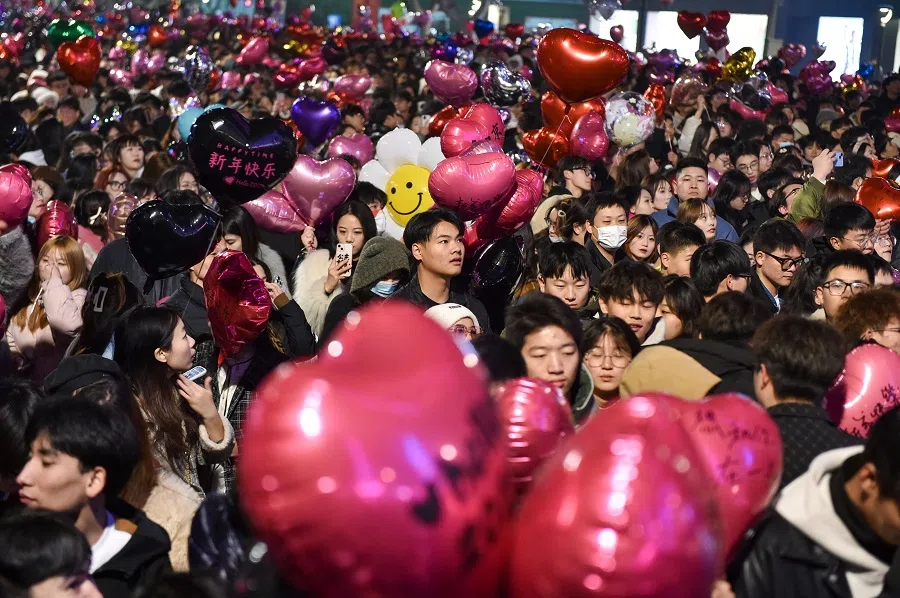[Big read] Young people in China unwilling to settle, not inclined to marry
Even as Chinese parents and the Chinese government are encouraging - and pressuring - young people to get married and have children, an increasing number of young people are more aware of themselves and what they want to get out of relationships, and are saying no to simply getting married for the sake of it.

With the end of another year, the elders in some Chinese families are pressuring the younger generation to get married, as they do during each festive season.
Jian Wen, 33, is an employee at a company in Foshan, Guangdong; he recently rejected yet another matchmaking session arranged by his parents.
After graduating from university, Jian worked alongside his parents and quickly owned a car and a property with his family's support. With his good work performance, he is seen as a "stock with potential".
Better safe than sorry
Over the past few years, Jian's parents have arranged over ten matchmaking sessions for him, but he remains single, and is growing increasingly resistant to his parents' concern and efforts over his marriage.
He said, "It's hard to meet someone suitable. I don't want to just settle."
In an interview with Lianhe Zaobao, he said marriage is not an urgent and necessary option in his life plans at the moment, and he can get along just fine on his own. Compared to being single, he is more worried about being trapped in a bad relationship.
Huang thinks that "bad relationships eat away at a person".
Huang Feiling, 31, who works in the legal field in Shanghai, shares similar sentiments and convictions. Although she is of marriageable age and also faces parental pressure to get married, she is neither anxious nor desperate to get married.
Huang, whose hometown is in Ningde, Fujian, currently lives alone in Shanghai. She told Lianhe Zaobao that although she also yearns for mental and emotional support, she is clear that marriage means two people journeying down a long path together, during which there could be twists and turns and changes, and so both parties have to be very conscientious before they decide to go into a relationship.

Huang thinks that "bad relationships eat away at a person".
She said that marriage must be between two people with the same values and who make each other better people. If she rushes into a relationship due to anxiety, fear or the desire to rely on someone, "my logical mind tells me that it will be disastrous".
As a lawyer, Huang has handled several divorce cases and witnessed women breaking down after their families fell apart. But this did not affect her attitude towards marriage - she is not averse to marriage. On the contrary, these experiences have become valuable references and allowed her to learn and sum up what it means to stay together in a marriage.
Huang said, "It will backfire if you relentlessly pursue it." In her view, becoming husband and wife calls for deep affinity. She believes in destiny, and will let nature take its course when it comes to marriage, without too much anxiety or expectations.
New approach to life
Huang's beliefs about marriage represent the attitude and thinking of a portion of independent women in this era who are rational and independent, have the right to choose and no longer see marriage as their only option.

Like Huang and Jian, more and more young people of marriageable age in China refuse to be anxious about getting married.
On Chinese social media platforms such as Xiaohongshu and Douyin, numerous bloggers have labelled themselves as "female empowerment", "free-living", "not getting married or having children", "single and living alone", and so on. They share their views on marriage and single life, and appear to be living comfortably and freely.
A 34-year-old blogger on Xiaohongshu with tens of thousands of followers said she does not want to get married because she gets more joy out of living alone than living with another person.
On her account, she said that in the past, her emotions were tied to her partner and her mood would be affected if the other party failed to meet her expectations. But she felt like a new person after ditching her need for a relationship.
Many people agreed, with a follower commenting, "You put my thoughts into words."
According to census data, the average marriage age for first marriages was 28.67 years old in 2020, up 3.78 years from 24.89 years old in 2010.
Delaying marriage
An increasing number of Chinese youths are choosing to put off or ditch marriage. Statistics from China's Ministry of Civil Affairs released in June 2023 showed that in 2022, a total of 6.83 million couples registered their marriages in 2022, down from 7.63 million in 2021, a record low since 1986.

As many as 13.46 million couples tied the knot in 2013, but the number of marriage registrations has since declined by nearly half over the past nine years.
At the same time, Chinese youths are getting married later. According to census data, the average marriage age for first marriages was 28.67 years old in 2020, up 3.78 years from 24.89 years old in 2010.
Shifting mindset
Why are Chinese youths increasingly unwilling to get married?
Ye Guoqing, who works in the matchmaking industry in Guangzhou, said when interviewed that the main force of the marriage market now are the post-80s and post-90s generation. They are well-educated, financially and mentally independent, know what they want in a partner and have a clear understanding of marriage.
Ye said that marriage is no longer necessary to many youths and they would rather stay single if they are unable to find someone who checks all the boxes.
Zhou Xiaopu, a professor with the School of Journalism and Communication at Renmin University of China, said in an interview that the 1980s can be taken as the turning point where there was a marked change in the modern concept of marriage in China.

She said that with some exceptions, the vast majority of marriageable-age youths born before the 1980s saw getting married and having children as part and parcel of life. But after the 1980s, following massive changes in society, the younger generation's concept of marriage and childbearing have also changed dramatically.
... greater unpredictability in life has exacerbated this trend of not wanting to get married and have children. - Zhou Xiaopu, Professor, School of Journalism and Communication, Renmin University of China
Coping with uncertainties
Zhou pointed out that it takes a host of reasons combined for a generation to shift their mindset on marriage. These reasons include economic conditions, societal environment, values and cultural education.
In the 1970s, under China's planned birth policy, most of those born in the 1980s and 1990s did not have siblings. They grew up with more attention paid to them, were more self-conscious, and knew exactly what they wanted out of life. For them, delaying marriage or giving it up is more of a conscious choice after doing a comprehensive assessment of their well-being.
She said that on the one hand, many youths face intense pressure at the workplace, and lack time to socialise and make friends, thinking that they "barely can take care of themselves", while on the other hand, the high property prices in cities, huge child-rearing cost and stiff competition in education all affect the willingness of the young to marry and have children.
Especially in recent years, with the increasingly complicated and severe economic conditions, some among the youth have relatively low incomes, and greater unpredictability in life has exacerbated this trend of not wanting to get married and have children.
However, Zhou also pointed out that even though it is common to see delayed marriage and childbearing, in the end, most young people would start a family. "It is normal to see people marry in their 30s and have children when they are nearing 40."
Overly high expectations
The higher expectations of young people towards their partner is another reason why young Chinese find it harder to get married. Chinese youths have also become more rational and calculating after three years of the pandemic.

According to a survey report released in early 2023 by the Chinese dating platform Jiayuan on how Chinese view marriage and relationships, more than 95% of single youths have expectations and goals for their potential partners, and among them, more than 40% have clear expectations. 58% of the single youths also prioritised "alignment of individual life goals" as a key consideration. The report said that this would make it even more difficult for young people to find their ideal partners.
Moreover, divorce rates continue to rise, and this has had an impact on individuals' willingness to get married.
According to official data, compared with 2022, China registered more marriages this year, with 40,000 more marriages in the first quarter compared with the same period last year, but the number of divorces also climbed, with 127,000 more divorces compared with the same period last year.
... they focus on a mindset and spiritual fit, agreeing with the traditional view of finding someone of similar status who are well-matched in various aspects. - Ye Guoqing, a matchmaking industry practitioner in Guangzhou
Perspective on marriage changed post-pandemic
Ye, who has eight years of experience in matchmaking, pointed out when interviewed that those of marriageable age have changed their ideas about marriage, especially after the pandemic when people experienced a sense of uncertainty and loss of control when it comes to future developments, which exacerbated this trend.
More and more youths are unwilling to be tied down by marriage, and look towards a life of freedom, valuing the actualisation of their self-worth.

She said: "We used to say that it is the middle-aged and elderly who partner up to spend their days, but now this mode of companionship is popular among the youths too."
Ye observed that many young people now feel that there is no need for a marriage certificate, and it would be good to find someone to spend their days with; more and more youths are also beginning to accept going Dutch in sharing the cost of living together.
She pointed out that compared to the past, today's youths are seldom blindly optimistic about marriage. Instead, they focus on a mindset and spiritual fit, agreeing with the traditional view of finding someone of similar status who are well-matched in various aspects.
These changes and trends have become more apparent in the last three years. "There are many who date, but few eventually get married."
She estimated that among the couples she handles, the number who eventually get married is about one-third of what it was eight years ago.
Local governments to build marriage dating platform
With the decline in marriages and birth rate, some local governments are experimenting with "national assistance to find the right match", building marriage dating platforms to help young people overcome this problem.

For example, Guangxi included youth marriages as part of its mid-to-long-term youth development plans in 2019, coming up with plans such as activities for youths to make friends, even mass weddings and so forth, as well as supporting the building of an online dating platform.
In Guixi, Jiangsu, the local government pushed for a minor reform of marriage customs, and set up a database of single people to build an online dating platform. According to China Youth Daily, 31 villages (communities) in Guixi had already set up matchmaking areas, with matchmaking agencies registered and approved and already providing services.
On today's youth marriage situation, Zhou said society at large should address this issue, seek to understand the perplexities faced by different groups of youths, and the deep-rooted reasons behind the changes in the concept of marriage, in order to find measures to address the problem and identify acceptable solutions.
She felt that essentially, only through solving the real problems of the youths and lowering their material and psychological burdens towards marriage and childbearing would the authorities be able to increase the willingness of young people to get married and inspire more of them to enter into marriage.
This article was first published in Lianhe Zaobao as "中国式催婚失效 大龄青年不将就结婚意愿降".



![[Video] George Yeo: America’s deep pain — and why China won’t colonise](https://cassette.sphdigital.com.sg/image/thinkchina/15083e45d96c12390bdea6af2daf19fd9fcd875aa44a0f92796f34e3dad561cc)
![[Big read] When the Arctic opens, what happens to Singapore?](https://cassette.sphdigital.com.sg/image/thinkchina/da65edebca34645c711c55e83e9877109b3c53847ebb1305573974651df1d13a)
